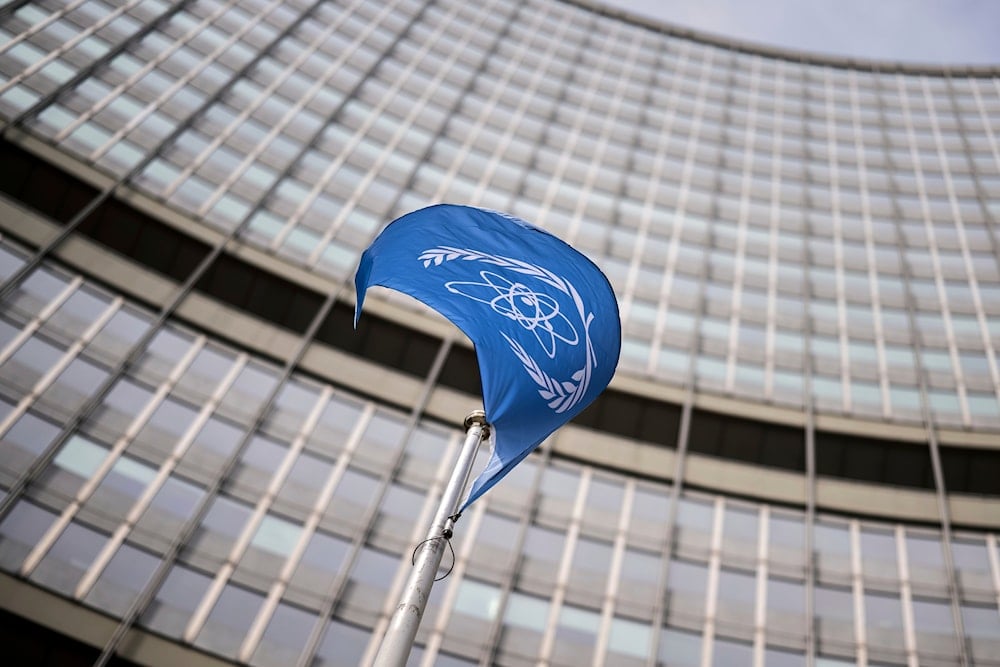Iran moves to suspend cooperation with IAEA over politicized stance
Iran advances a proposal to end cooperation with the IAEA, accusing the agency of political bias and considering a permanent entry ban on its director.
-

A flag waves in front of the International Atomic Energy Agency (IAEA) in Vienna, Austria, Monday, June 23, 2025. (AP)
Iran's National Security and Foreign Policy Committee has endorsed a proposal to halt cooperation with the International Atomic Energy Agency (IAEA), citing the agency's perceived political bias.
Ebrahim Rezaei, spokesperson for the committee, stated that members voted in favor of the proposal's general outline during a meeting held on Monday. "At today's meeting of the parliament's National Security Committee, members of this committee voted for the general outline of the proposal, which requires the government to suspend cooperation with the IAEA," he said, as reported by Tasnim news agency.
Earlier in the day, Iranian Parliament Speaker Mohammad Bagher Ghalibaf expressed his support for moving forward with legislation to cease collaboration with the UN nuclear watchdog. He criticized the IAEA's approach, describing it as politically driven and lacking impartiality.
In a related development, Esmail Kowsari, a member of the parliamentary security commission, proposed that Iran's Supreme National Security Council consider a permanent ban on IAEA Director General Rafael Grossi from entering the country.
IAEA chief urges Iran to disclose uranium transfers after US strike
In a different context, Grossi called on Monday on Iran to clarify the whereabouts of enriched uranium allegedly relocated from key nuclear facilities prior to the recent US and Israeli strikes.
Speaking at an emergency session of the IAEA Board of Governors convened to address the attacks on Iran’s nuclear infrastructure, he underscored that Tehran is obligated under its safeguards agreement to inform the agency of any transfer of nuclear material from monitored sites.
“There is a need to notify the Agency of any movement of nuclear materials from safeguarded facilities to other locations in Iran,” Grossi said. “Establishing facts on the ground is essential to any agreement, and that can only be achieved through IAEA inspections.”
He urged Iran to return to the negotiating table and emphasized that IAEA inspectors, described as guardians of the Non-Proliferation Treaty (NPT), must be granted access to the affected nuclear sites. Grossi specifically cited the need to verify the status of Iran’s stockpile of 400 kilograms of uranium enriched to 60%, which he said remains a central concern.
Grossi accused of bias
On his part, Iran's Permanent Representative to the United Nations, Amir Saeed Iravani, said the public remarks made by Grossi on the eve of the Israeli aggression against the Islamic Republic of Iran constitute a glaring violation of the principle of neutrality required in his position.
Grossi had also remarked that “nuclear sites must never be attacked,” yet pointedly refrained from condemning the Israeli aggression on Iran’s nuclear facility, an omission that Tehran views as tacit complicity.
Iravani filed a formal complaint against Grossi, in a letter to the UN Security Council, voicing deep concern over Grossi's grave dereliction of duty, as well as his failure to fulfill his legal responsibilities under the agency's statute.
The Iranian diplomat further noted that Grossi not only failed to condemn the attacks on nuclear facilities under IAEA safeguards but also disregarded the open acknowledgment by "Israel" of its ongoing assaults.
Read next: Tehran launches last volley, casualties reported in Beer al-Sabe'

 3 Min Read
3 Min Read










